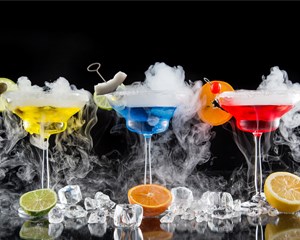In 1626, the English philosopher Sir Francis Bacon was one of the first westerners to discover a new use for ice, after packing a dead chicken in snow in the hope of preserving its flesh. He succeeded (in his own words, "excellently well"), but in so doing unfortunately caught a chill that would, several days later, be the death of him.
1626年,英國哲學(xué)家弗朗西斯·培根爵士將一只死雞裹在雪里來保存肉質(zhì),最后他成功了(他是這么說的:“真是好極了!”),由此成為了最早發(fā)現(xiàn)冰的新用途的西方人之一。不幸的是,用這種方法嘗試幾次后他染上了風寒,并于幾天后去世。
It was not until 1785 that Bacon's insight found widespread acceptance – and even then, it was only thanks to a chance encounter between one Alexander Dalrymple, an official of the East India Company, and George Dempster, its former director. Dalrymple mentioned in passing that the Chinese fishermen who operated in the waters around the company's trading post in Canton were in the habit of taking ice on their fishing trips in order to preserve their catch at sea, and then to transport it over long distances once on shore. Dempster was sufficiently intrigued to write to his salmon supplier in Scotland, who sent a consignment of fish on ice, by sea, to London – it arrived, six days later, perfectly fresh.
培根保存肉質(zhì)的方法直到1785年才被大眾普遍接受——即便在那個時候,也要感謝東印度公司的官員亞歷山大·達爾林普爾和其前董事喬治·登普斯特的一次偶遇。達爾林普爾還順帶提及,在該公司位于廣州的貿(mào)易站附近水域作業(yè)的中國漁民習慣在捕魚時帶上冰塊以保存在海上的漁獲,上岸之后再進行長距離運輸。鄧普斯特對此很感興趣,他寫信給他在蘇格蘭的三文魚供應(yīng)商,供應(yīng)商將一批帶冰的魚通過海路寄到倫敦,六天后魚到了,非常新鮮。

This chance conversation set in motion a booming trade in what had been a hitherto overlooked commodity. When Joseph Marr, The Ice Co's founding father, decided to expand his fish-curing business in Hull into a fish-catching one, ice was an absolute necessity. When the company moved to Fleetwood on the other side of the country in 1896, in pursuit of hake (then abundant off the UK's west coast), ice was what his son, James Herbert, imported from Norway, and subsequently stored in a giant cork-lined ice-house. And ice, again, was what the company started to manufacture for itself in 1908, as a third generation of Marrs settled into the daily rhythm of fishing boats coming and going – leaving stocked with ice, returning stocked with slightly less ice, and fish.
這次偶然的談話引發(fā)了一場迄今為止一直被忽視的大宗商品交易的蓬勃發(fā)展。當The Ice Co的創(chuàng)始人約瑟夫·馬爾決定把他在赫爾的養(yǎng)魚業(yè)務(wù)擴大到捕魚業(yè)務(wù),冰成了必需品。1896年,該公司搬到了英國另一邊的弗利特伍德,為了追尋鱈魚(當時英國西海岸盛產(chǎn)鱈魚),他的兒子詹姆斯·赫伯特從挪威進口了冰塊,隨后將之儲存在一個巨大的軟木貼面冰庫里。等到了馬爾家族第三代,每天來來往往的漁船已經(jīng)形成了一種固定的模式:離開時帶著冰塊,回來時帶著稍少的冰塊和魚。自此The Ice Co公司開始自己生產(chǎn)冰塊。
To Joseph Marr, the idea that people might one day manufacture ice from water would doubtless have seemed fanciful, if not outright sacrilegious. As recently as 1844, when the American inventor John Gorrie took to the pages of the Commercial Advertiser to argue "we know of no want of mankind more urgent than a cheap means of producing an abundance of artificial cold", he did so under a pseudonym, for fear of reprisals.
將來的某一天人們可能能夠用水造冰,這個想法對于約瑟夫·馬爾來說不僅有些褻瀆神靈,而且無疑是天方夜譚。直到1844年,當美國發(fā)明家約翰·戈里在商業(yè)廣告中聲稱“我們知道,人類最急需的就是一種能夠以低成本制造大量人工冷氣的方法”。為了避免被報復(fù),他使用了假名。
Gorrie, a doctor who specialised in treating malaria, had already produced a prototype of the modern air conditioner that blew air across a block of ice hanging above a feverish patient. In 1851 he received a US patent for one of the world's first ice-making machines, which harnessed the cooling properties of pressurised gases as they expanded. He was right to have worried about being deemed heretical: after a successful demonstration of his machine in 1850 at a dinner party at The Mansion hotel in Florida (an event Smithsonian magazine subsequently dubbed "the chilly reception"), the New York Globe derisively reported that "There is a Dr Gorrie, a crank down in Apalachicola, Florida, that thinks he can make ice by his machine as good as God Almighty". But Gorrie did not live to enjoy his vindication: he failed to find financial backers for his product, and died, impoverished, five years later.
格里是一位主治瘧疾的醫(yī)生,他制造出了一種現(xiàn)代空調(diào)的原型,可以把空氣吹過掛在發(fā)燒病人上方的冰塊。1851年,他獲得了世界上第一臺制冰機的美國專利,這種制冰機利用了受壓氣體膨脹時的冷卻特性。他擔心自己會被視為異類,事實也確實如此:1850年,他在佛羅里達的大廈酒店的一次晚宴上成功展示了自己的機器(《史密森尼雜志》隨后稱這次活動為“冷宴”),之后,《紐約環(huán)球報》曾嘲笑地報道說:“佛羅里達州的阿帕拉奇科拉市有一位格里博士,他說自己的機器能像萬能的神一樣制造冰塊。”然而,格里在自己得到辯護之前就去世了:他沒能為自己的產(chǎn)品找到資助人,五年后窮困潦倒地去世了。











